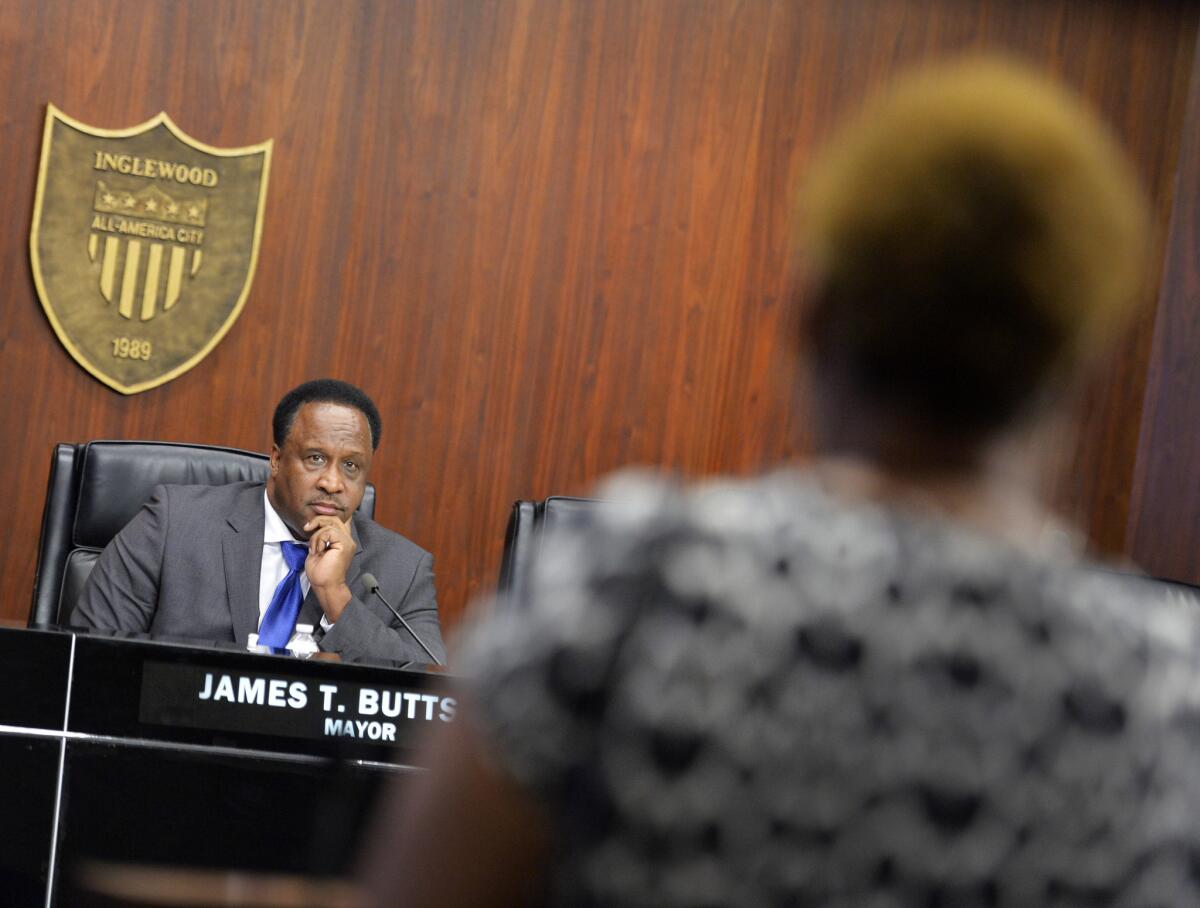Suppression of public participation or greater efficiency? Inglewood makes council meetings earlier

Inglewood Mayor James T. Butts listens to a constituent during a City council meeting in March. A recent vote to change the time of all council meetings has drawn criticism from the public.
- Share via
To Inglewood officials, a vote to change the time of all council meetings to the early afternoon is about being more efficient. But to some residents, it’s just the city’s latest attempt to suppress public participation--or grumbling.
As Paola Aliaga, 43, sees it, Inglewood is really voting to eliminate evening meetings so that people like her have a harder time making it there. Aliaga said she left work earlier one day this month, wading through congested streets to attend a 2 p.m. meeting so she could deliver letters from eight residents who were unable to attend.
“You need to keep meetings at 7 p.m. to serve the larger community,” she said.
On Tuesday, the council voted unanimously, 5 to 0, to eliminate those council meetings in favor of the earlier time.
Before the decision, the council met in open session to discuss city business at 2 p.m. on the first and third Tuesdays of each month and 7 p.m. on the second, fourth, and fifth Tuesdays of each month.
In a staff report, City Manager Artie Fields said residents complained the weekly change in meeting times was confusing. Additionally, day meetings would save staff time by allowing staff, who sometimes have to be on standby to present oral reports, to continue working unless their direct presence is required.
“If that’s their genuine motivation, then it appears that they’ve prioritized the efficiencies of the city’s bookkeeping system over the involvement over the city’s residents,” said Dan Schnur, director USC’s Jesse M. Unruh Institute of Politics. “The only plausible reason for a shift like this is to minimize the possibility of community involvement and oversight.”
City Councilman Eloy Morales Jr. disagrees, saying the evening meetings use to stretch into the wee hours of the morning.
“We would go until 2 to 3 o’clock in the morning and continue at 8 a.m.,” he recalled. “Very little was getting done. The results we are seeing today is the city I want to live in.”
Inglewood has recently been admonished for trying to silence political critics.
Last month, a federal judge ordered the city to pay $117,741 in legal fees of a local resident whom the city unsuccessfully sued for using snippets of City Council meetings in YouTube videos that were critical of elected officials. In addition, the city had set aside $50,000 to pay its own legal costs to bring the lawsuit.
Since then, the city has stopped posting the City Council meetings on YouTube and limited the time residents can speak during closing comment from 2 minutes to 1 minutes.
Some of the City Council’s staunchest critics said that the city clerk’s office has repeatedly refused to provide them video recordings of the city meetings. Diane Sambrano and Joseph Teixiera – the resident Inglewood unsuccessfully sued -- bring handheld video cameras to record the sessions.
Mayor James T. Butts said the city plans to start recording council meetings again at the beginning of 2016.
“We are not recording because the equipment is antiquated and has to be replaced,” he said Tuesday.
Longtime resident Sterling Gordon said he took a survey of the start times of surrounding city council meetings and found that no other city of a similar size had early afternoon meetings.
“You will not have the representation of people who work during the day,” Gordon said. “You are disenfranchising the citizens of Inglewood. There’s no way you can consider that fair for us.”
Jessica Levinson, a clinical law professor at Loyola Law School who serves on the Los Angeles Ethics Commission, said Inglewood is not an outlier. In California, several city councils, including Los Angeles, San Diego and San Jose, convene in the mornings and early afternoon.
“What strikes me as unusual is that they are moving from a time that was preferable for people who might have trouble getting there in the middle of the day to a less convenient time,” she said.
For more California breaking news, follow @AngelJennings. She can also be reached at angel.jennings@latimes.com.
More to Read
Sign up for Essential California
The most important California stories and recommendations in your inbox every morning.
You may occasionally receive promotional content from the Los Angeles Times.














